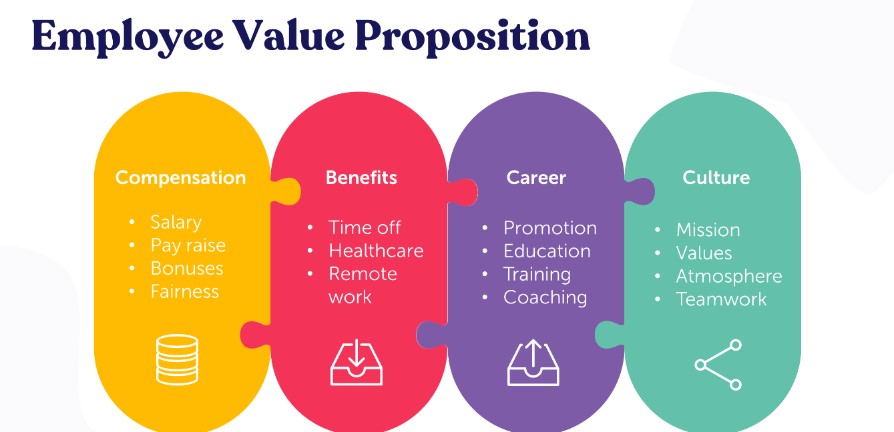The Employer Value Proposition ~
In today’s competitive job market, attracting and retaining top talent is a key priority for organizations. To achieve this, companies need to develop and communicate a compelling Employer Value Proposition (EVP). EVP is the unique set of offerings, benefits, and values that an employer provides to its employees in exchange for their skills and contributions. In this blog post, we will explore the concept of EVP, its significance in talent acquisition and retention, and provide guidance on developing and communicating a compelling EVP to prospective candidates.
Understanding Employer Value Proposition (EVP):
EVP is the overall package of tangible and intangible benefits that an employer offers to its employees. It encompasses a wide range of factors, including salary and benefits, work-life balance, career development opportunities, organizational culture, and the overall employee experience. EVP serves as the foundation for attracting, engaging, and retaining top talent.
The Significance of EVP in Attracting and Retaining Top Talent:
- Differentiation: In a crowded job market, a strong EVP helps differentiate an organization from its competitors. It showcases the unique advantages and benefits that employees can expect when working for a particular company. A compelling EVP positions the organization as an employer of choice, attracting high-quality candidates.
- Employee Engagement and Retention: A well-defined EVP fosters a sense of belonging, purpose, and commitment among employees. It helps create a positive work environment, promotes employee engagement, and increases retention rates. When employees feel valued and aligned with the organization’s values, they are more likely to stay and contribute to its success.
- Talent Acquisition: An attractive EVP acts as a magnet for top talent. It not only helps attract highly skilled candidates but also encourages passive job seekers to consider new opportunities. A compelling EVP enables organizations to build a pipeline of qualified candidates, ensuring a competitive edge in the talent market.
Developing a Compelling EVP:
- Identify and Understand Target Audience: Begin by identifying your target audience – the types of candidates you want to attract and retain. Understand their motivations, aspirations, and expectations to tailor your EVP accordingly.
- Define Core Values and Culture: Define your organization’s core values, mission, and culture. These elements shape the identity and reputation of your employer brand. Align your EVP with these values to attract candidates who share similar beliefs and aspirations.
- Conduct Employee Surveys and Feedback: Engage with your current employees to gather insights on what they value most about working for your organization. Conduct surveys and feedback sessions to understand their needs, expectations, and suggestions. This input will inform the development of your EVP.
- Craft a Compelling Employee Value Proposition: Use the insights gained from employee feedback to develop a compelling EVP. Focus on key areas such as competitive compensation and benefits, career growth opportunities, work-life balance, inclusive and diverse culture, and meaningful work. Highlight the unique aspects of your organization that set it apart from competitors.
- Test and Refine: Test your EVP by seeking feedback from potential candidates and current employees. Iterate and refine your EVP based on their input to ensure its relevance and appeal.
Communicating Your EVP to Prospective Candidates:
- Employer Branding: Effectively communicate your EVP through consistent employer branding efforts. Develop a strong online presence across relevant platforms, such as your company website, social media channels, and professional networking sites. Showcase employee testimonials, success stories, and company culture to convey your EVP to prospective candidates.
- Tailor Messaging: Tailor your messaging to align with the needs and aspirations of your target audience. Highlight specific aspects of your EVP that resonate with their motivations and career goals. Use compelling language and visuals to convey your employer brand effectively.
- Engage Current Employees as Brand Ambassadors: Encourage your current employees to be brand ambassadors by sharing their positive experiences and testimonials. Leverage their networks and encourage them to participate in employer branding initiatives, such as employee referral programs or social media campaigns.
- Leverage Multiple Channels: Use a multi-channel approach to reach a wider pool of candidates. Utilize job boards, social media platforms, industry events, and career fairs to promote your EVP and attract top talent.
Conclusion:
Developing and effectively communicating a compelling Employer Value Proposition (EVP) is vital for attracting and retaining top talent in today’s competitive job market. By understanding the concept of EVP, organizations can differentiate themselves, engage employees, and attract high-quality candidates. Developing a compelling EVP involves identifying target audiences, defining core values, and crafting an EVP that aligns with the needs and aspirations of employees. Communicating the EVP through employer branding efforts and engaging current employees as brand ambassadors ensures that the organization’s unique offerings are effectively conveyed to prospective candidates. By investing in a strong EVP, organizations can build a talented workforce that drives their success and competitive advantage.

